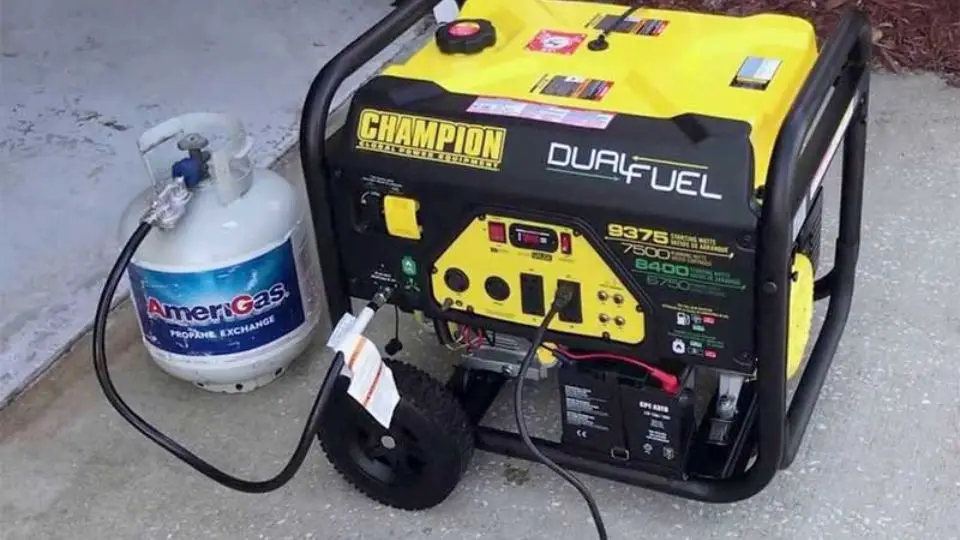This post may contain affiliate links. As an affiliate, we earn from qualifying purchases. We get commissions for purchases made through links in this post.
Portable generators have become a popular choice for individuals seeking backup power during outages or requiring electricity in remote locations. However, one of the most common questions people have is how long can a portable generator run continuously. The answer, though not straightforward, depends on various factors, including the generator’s fuel type, model, fuel tank capacity, and load.
In general, gas-powered portable generators can run for approximately 6 to 10 hours on a full tank, assuming a 50% load. Some models feature larger fuel tanks, enabling them to operate for 18 hours or even more. Having said that, if your intention is to run a portable generator non-stop, other considerations come into play, such as fuel efficiency, maintenance requirements, and the typical load you put on a generator. It is also worth mentioning that portable generators are generally not designed for continuous operation around the clock, unlike their standby (or whole-house) counterparts.
How Long Can a Portable Generator Run Continuously?
Most popular gas or propane-powered portable generators will run from 8 to 12 hours at a 25% load. If you get a bigger-sized generator it can run for up to 16 hours on one full tank of fuel. The runtime decreases significantly as you load your generator close to 100%. On a half load, you can expect around 5 hours of run time from most portable gas-powered models. In general, the bigger the fuel tank the longer the generator will run continuously.
Let’s have a look at some popular generator models and their runtime.
| Model | Run Time (25% load) | Run Time on 50% load | Wattage |
|---|---|---|---|
| Champion Power Equipment 100813 | 10 hours | 8 hours | 7,500W |
| Westinghouse WGen9500DFc | 12 hours | 7 hours | 8,500W |
| Generac 7683 GP6500 | 16.5 hours | 11.5 hours | 6,500W |
Keep in mind, we are talking about conventional portable generators. When it comes to inverter models, you are getting much more run time on the same amount of fuel. For example, a WEN 56450i Super Quiet 4500-Watt RV-Ready Portable Inverter Generator provides up to 8.5 hours of run time at a half load on a small 2.2 gallons fuel tank.
Overall, the run time of a portable generator can vary depending on several factors. Understanding them is crucial for determining how long a generator can run continuously and ensuring its optimal performance. Let’s explore some of the key factors that can affect the run time. Later on in this section, you will also find out how to calculate the continuous run of any portable generator.
What Affects the Run Time?
The run time of a portable generator is affected by several factors, including the type of fuel it uses, the generator’s wattage, and the load you put on it. Gas-powered generators, for example, typically run for around 10 hours on a full tank, while natural gas generators can run continuously as long as they have a steady supply of fuel.
The wattage of the generator and the load it’s under also affect how long it can run. If the generator is feeding the power-demanding equipment like a refrigerator plus an AC and a heat pump, it will run for a shorter period. On the other hand, if it’s only powering lights or fans, it can run for a longer time.
How to Calculate Run Time for a Portable Generator?
To calculate the run time of a portable generator, you need to know the fuel capacity, the fuel consumption rate, and the power load. For example, if a generator’s fuel tank is 5 gallons and its fuel consumption rate is 0.5 gallons per hour, it can run for 10 hours at half load.
It is also important to note that different generator models have different power efficiency. So it’s best to consult with the generator’s specifications provided by the manufacturer.
If you still want to calculate everything manually, you can use the following formula:
Generator Running Hours (at 50% load) = Tank Capacity (Gallons) / Fuel Consumption (in Gallons per Hour at 50% load)
Run time also differs when using different types of fuel. For example, some portable generators can run on both gas and propane, so-called dual-fuel generators. They will always consume significantly more propane, so run time will decrease drastically.
Periodic Maintenance
Proper maintenance is critical to ensure a portable generator runs smoothly and efficiently. This includes regular oil changes, checking the oil level before each use, and shutting off the generator when refueling.
It’s also essential to follow the manufacturer’s guidelines for maintenance and to only use the appropriate fuel type. Using the wrong fuel or not performing proper maintenance can lead to a reduced lifespan, increased fuel consumption, and even safety hazards like carbon monoxide poisoning.
In conclusion, the run time of a portable generator depends on several factors, including fuel type, wattage, and load from appliances. To calculate the run time, you need to know the fuel type, tank capacity, fuel consumption rate, generator power efficiency, and percentage of load. Proper maintenance is crucial to ensure the generator runs efficiently and safely.
Portable generators that can run for many hours
When it comes to portable generators, run time is a critical factor to consider. If you need a generator that can run for many hours, there are several models available on the market that you can choose from. Here are some of the most popular ones:
| Model | Run Time (Full Load) | Run Time (Half Load) | Fuel Type | Consumption | Wattage |
|---|---|---|---|---|---|
| Honda EU7000iS | 6.5 hours | 18 hours | Gasoline | 0.32 GPH | 7,000W |
| WEN DF1100T | 5 hours | 8.5 hours | Dual Fuel | 0.78 GPH (Gasoline) 1.57 GPH (Propane) | 11,000W |
| Westinghouse WGen9500DF | 6 hours | 12 hours | Dual Fuel | 0.83 GPH (Gasoline) 0.67 GPH (Propane) | 9,500W |
| Pulsar G12KBN | 6 hours | 12 hours | Dual Fuel | 0.67 GPH (Gasoline) 0.94 GPH (Propane) | 12,000W |
As you can see from the table above, these generators can run for many hours, depending on the fuel type and load. The Honda EU7000iS, for example, can run for 6.5 hours at full load and up to 18 hours at half load on gasoline. The WEN DF1100T, on the other hand, can run for 5 hours at full load and up to 8.5 hours at half load on gasoline.
The Westinghouse WGen9500DF is a dual-fuel generator that can run for up to 6 hours at full load and 12 hours at half load on a 6.6-gallon gasoline tank or up to 7 hours on a 20-pound propane tank. The Pulsar G12KBN can run for around 6 hours at full load and up to 12 hours at half load on a full tank of gas. Honda EU7000iS appears to be the most long-running and it is the most fuel-efficient out of the 4.
When choosing a portable generator that can run for many hours, it’s essential to consider the fuel type, consumption rate, and load. Dual fuel generators, for example, can run on both gasoline and propane, which can be more convenient and cost-effective in the long run. Additionally, generators with lower consumption rates can save you money on fuel costs and run for longer periods.
Do Portable Generators Use More Fuel When They Are Loaded?
When a portable generator is loaded, it means that it is supplying power to electrical devices. The more devices that are connected to the generator, the more power it will have to produce. As a result, the generator will use more fuel to generate the additional power required.
However, the amount of fuel used by a generator when it is loaded depends on several factors. These factors include the size of the generator, the type of fuel it uses, and the amount of power being produced.
For example, a small portable generator that is loaded with a few devices will use less fuel than a larger generator that is not loaded enough. Similarly, a generator that runs on propane will use more fuel than one that runs on gasoline or diesel.
In general, it is recommended that you only load a portable generator for up to 50%. This will help to conserve fuel and ensure that the generator runs efficiently.
To help you determine how much fuel your generator will use when loaded, you can consult the manufacturer’s specifications. Most manufacturers provide information on how much fuel their generators consume at different loads.
While the values specified in your generator’s manual are close to what you will get in real life, if you absolutely need to know the exact fuel consumption, you can measure it by putting different amounts of loads and testing how long your generator will run.
Can You Run a Portable Generator for 24 Hours?
The question often arises whether it is safe and feasible to operate a portable generator for a full 24 hours without interruption. The answer to this query relies on factors such as generator maintenance frequency, fuel availability, and the specific model of the generator in question.
Generally, most portable generators are not designed for continuous operation. The capacity of their fuel tanks is insufficient to sustain them for such an extended period. Consequently, they require frequent refueling. Moreover, the engines used in portable generators are typically smaller and less durable compared to those found in backup generators.
Nonetheless, there are certain models available that can be used for continuous 24-hour operation, albeit only on occasion. These models are typically larger and more powerful, specifically engineered for commercial or industrial use. They boast larger fuel tanks and are constructed to withstand prolonged usage. Below are some popular models of portable generators intended for continuous running:
- Honda EU7000is: The Honda EU7000is is a powerful inverter generator that is designed to deliver reliable and efficient performance. It has a large fuel tank capacity and low fuel consumption, allowing it to run for extended periods. This model is known for its quiet operation and clean power output, making it suitable for both recreational and commercial use.
- Generac XD5000E: The Generac XD5000E is a heavy-duty diesel generator built for demanding applications. It features a robust engine and a large fuel tank that enables it to run continuously for extended periods. With its sturdy construction and reliable performance, this generator is often chosen for construction sites, backup power in commercial settings, and other industrial applications.
- Westinghouse WPro12000: The Westinghouse WPro12000 is a high-capacity portable generator designed for heavy-duty usage. With its powerful engine and large fuel tank, it can provide sustained power for extended periods. This model offers multiple outlets and is suitable for both residential backup power and industrial applications where continuous operation is required.
It is crucial to monitor the generator’s oil level and perform regular oil changes. Most portable generators tend to deplete their oil levels after approximately 100-200 hours of operation. The frequency of oil change can be increased if using a generator in adverse weather conditions and on/or at high loads constantly. It is always advisable to check the oil level each time you refuel. Many modern generators are equipped with an automatic shut-off feature that activates when the oil level becomes low, safeguarding the engine from potential damage.
How much fuel does a portable generator use per hour?
The amount of fuel a portable generator uses per hour depends on several factors, such as the generator’s wattage, fuel type, and load capacity. Generally, a portable generator can consume between 0.32 to 0.83 gallons of fuel per hour, depending on its size and load.
For example, a 5-kW generator can consume about 0.75 gallons of gasoline per hour, while a 10-kW generator can consume up to 1.5 gallons of gasoline per hour. However, keep in mind that these are just estimates, and the actual fuel consumption can vary based on the generator’s load and other factors.
When it comes to fuel type, gasoline is the most common fuel used for portable generators. The second popular fuel type for a portable generator is propane. Besides that, there are a few diesel portable generator models (but not many). Gas and propane-powered generators can also be converted to run on natural gas. Of all the types of fuels for generators, diesel is the most efficient, however, it is hard to find a portable generator that runs on diesel. Along with that, diesel generators are significantly more expensive than all the others.
To estimate how much fuel a portable generator will use per hour, you can check the manufacturer’s specifications or use a fuel consumption calculator. These tools can help you determine the generator’s runtime and fuel consumption based on its wattage and load capacity.
It’s important to keep in mind that running a portable generator continuously for long periods of time can be expensive and may not be necessary in all situations. If possible, it’s best to conserve energy and only use the generator when needed to save fuel and reduce costs.




3 thoughts on “How Long Can a Portable Generator Run Continuously?”
Comments are closed.